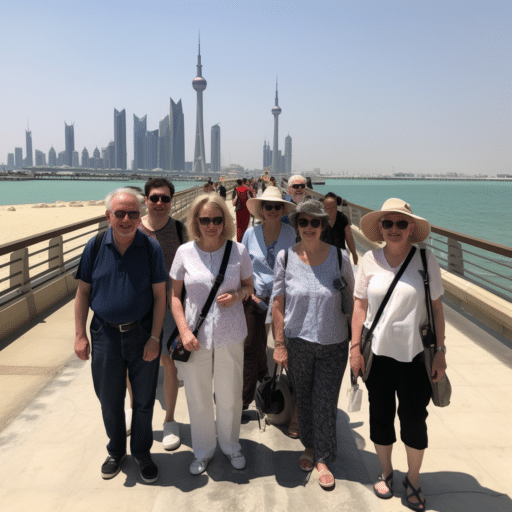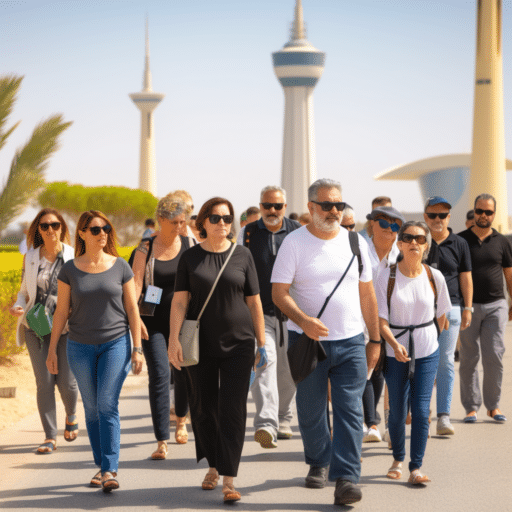Sitemap: Living Abroad > Living in Kuwait
Despite its small size, two-thirds of Kuwait population consists of expats who have been enticed by the nation’s thriving oil business and financial sector.
Given the constraints on property ownership, renting is the preferable option. The nation’s lasting appeal is a result of its prosperous economy, high salaries, and tax-free incentives, which help to attract foreign experts.
A luxurious lifestyle and the opportunity to fully embrace Arab customs are what Kuwait has to offer. Economic opportunity and cultural richness coexist in this Gulf country, making it an attractive expat destination.
In this page, we’ll cover various talking points including:
- Living in Kuwait 101
- Cost of living in Kuwait
- Kuwait weather
- Kuwait jobs
- Kuwait currency
- Kuwait visa
- Is Kuwait safe for investments?
If you are looking to invest as an expat or high-net-worth individual, which is what I specialize in, you can email me (advice@adamfayed.com) or WhatsApp (+44-7393-450-837).
Living in Kuwait 101
Kuwait offers many leisure activities outside of work, including restaurants, shops, beaches, and desert tours.
The largest Middle Eastern opera house is worth mentioning for art aficionados. Kuwaitis socialize on floor cushions before dinner, creating a warm and pleasant ambiance.
Arabic proficiency is not needed because English-speaking people and global enterprises abound. International workers with desirable capabilities flock to the rising Kuwait economy for job opportunities.
Kuwait’s hospitality and professional advancement prospects make it appealing to those seeking satisfying careers and cultural immersion.

Cost of Living in Kuwait
The cost of living in oil-rich Kuwait is comparable to numerous European countries.
Investment opportunities abound due to low house prices and no car taxes.
Lifestyle choices affect living costs, but expats can settle.
Some firms offer low rentals or free housing.
Hot weather reduces the need for large wardrobes, although costly brands can cost more.
Arabic food is a highlight of Kuwait’s diverse cuisine. Although imported goods are more expensive, savvy shoppers might find cheaper alternatives in their local markets.
Healthcare in Kuwait
Healthcare is free in Kuwait, although it’s often poor. Public hospitals provide free medical care, although X-rays and other specialized testing may be unavailable or expensive.
Because of this, many patients seek therapy at private clinics or in other Western countries. People who need immediate aid often prefer private services instead of public due to high wait times.
The country had two hospital beds per 1,000 people in 2016, according to The Borgen Project. In response, the Ministry of Health is building new facilities and improving supply to meet healthcare targets by 2030.
Education in Kuwait
The Kuwaiti government requires all six-to-14-year-olds to attend school from September to June. Even though the instruction is strong, many students struggle with Arabic, the official Kuwait language.
This is why many foreign parents send their children to one of the several private international schools in the area. Arabic is required at private schools, but English is the language of instruction.
Despite the outstanding education system and small class sizes, international schools have extensive waiting lists. Thus, planning ahead for any transfer is usually wise.
As everywhere else, these schools can be expensive, so parents should plan ahead to ensure they can afford their children’s education.
Kuwait Weather
Warm winters and hot summers are hallmarks of Kuwait’s subtropical desert climate, which is otherwise sunny and pleasant all year round.
The months of November through April get the bulk of the year’s precipitation, which averages just over 100 millimeters (4 inches).
At this time of year, showers are more likely to be intermittent and less common, although they can be intense enough to cause flooding on rare occasions. The weather patterns of Kuwait are characterized by high heat and dryness, which are exacerbated by the region’s dry climate.
Kuwait currency
The Kuwaiti Dinar is the currency of Kuwait. Among the world’s most valuable currencies, the Kuwaiti Dinar is widely used for domestic investments and financial activities.
Kuwait Culture
Kuwait is tolerant, yet it bans alcohol and pork, with certain exceptions for select groups. Many people wear fashionable outfits and traditional abayas, displaying how diverse civilizations have influenced fashion.
Muslims fast, and non-Muslims don’t eat or drink in public during Ramadan. Kuwait celebrates pearl diving and camel racing to preserve its culture.
Diwaniyas is where men discuss politics and hang around, and women’s gatherings keep society together. Kuwait has a rich culture despite its limitations. Plenty to do, from beach clubs to local holidays and traditions.
Expat Life in Kuwait
Expat life in Kuwait is best for foreigners who want to move up in their careers. About 7,000 Brits are drawn to the country’s warm weather, low taxes, and diverse culture, according to iExpats.
Two-thirds of Kuwait’s 4.2 million people are expats, who are drawn there by the country’s strong economy, which is powered by the world’s sixth-largest oil industry.
The country has low fuel costs, great schools, and good health care, all thanks to big investments from around the world. Overall, good living standards are helped by social welfare services.
Despite these advantages, getting around Kuwait’s complicated infrastructure and enjoying its rich culture are both difficult. This guide slowly reveals the subtleties of foreign life in Kuwait. It gives a thorough look at the moving process, including both the pros and cons.
Expat Communities in Kuwait
Hawally
Hawally is a popular residential area in Kuwait with a significant expat population, offering diverse amenities and housing options.
Salmiya
Salmiya is a bustling commercial and residential district known for its vibrant expat community, numerous shopping malls, and seaside promenade.
Fintas
Fintas is a suburban area that attracts expatriates with its quieter atmosphere, family-friendly environment, and proximity to schools and amenities.
Mangaf
Mangaf is a coastal neighborhood with a considerable expat presence, offering beachfront living and a range of recreational facilities.
Ahmadi
Ahmadi, home to the oil industry, has a diverse expat population, providing a mix of residential and industrial areas along with community facilities.
Kuwait City
The capital city, Kuwait City, is a hub for expats, featuring cultural attractions, business centers, and diverse residential options in districts like Sharq and Mirqab.
Jabriya
Jabriya is a residential area known for its educational institutions, making it a preferred choice for expat families seeking proximity to schools and universities.
Expat Taxes in Kuwait
Income taxes are waived for Americans and foreigners in Kuwait. Individuals pay no income tax, but corporations pay 15%.
Both employers and employees must contribute a portion of their earnings to social security, up to 2,750 Kuwaiti dinars (the official Kuwait currency).
American expats in Kuwait do not pay social security. Citizen-based taxes in Kuwait apply to US citizens regardless of where they dwell.
Due to Kuwait’s lack of social security or income tax, expats solely pay US taxes. Kuwait does not tax expats and has no US-Kuwait tax treaty.
Kuwait Jobs
The oil industry attracts most expats to Kuwait, but the country’s growing financial sector, marketing, sales, and company development opportunities also attract many.
After a new rule banned expats over 50 from public sector jobs, Kuwaiti and global firms often hire foreigners.
Due to initiatives to reduce foreign nationals by one million over the next decade, employment opportunities have decreased due to rising competition from local college graduates and a preference for internal promotion.
Kuwait can provide promising prospects to foreigners with proper qualifications and professional experience despite challenges.
Related Content: Working In Kuwait As An Expat
Kuwait Work Visa
Expats living and working in Kuwait need an iqama. A valid government or commercial work offer is needed to obtain this Kuwait visa. The foreign worker’s Kuwaiti employer will then apply for iqama.

A “No Objection Certificate” (NOC) is needed to enter Kuwait.
Your resident visa is issued upon entering Kuwait.
Resident visa applicants must produce a complete medical certificate with HIV/AIDS, hepatitis, and tuberculosis testing.
After receiving the residency visa, a Kuwaiti Civil ID (bitaqa-almadaniyah) can be obtained.
This application is due 30 days after receiving the resident visa.
Is Kuwait safe for investments?
Kuwait is a safe place to invest for all ages and income levels. Financial advisers advise diversifying into international markets to establish a robust investment portfolio.
Kuwait is an attractive investment destination in the GCC due to its strong global rankings. Kuwait’s status as the third most tax-friendly nation, second-best macroeconomic climate, and second-highest gross national savings make it notable.
New Kuwait Vision 2035, the government’s long-term plan, emphasizes its desire to diversify the economy away from petrochemicals.
Investing in the Kuwait Stock Market
Expats have many investment options in foreign countries thanks to banks. Money market funds are low-risk and liquid, making them ideal for beginner investors.
Equity funds invest mostly in shares for long-term growth. Equity funds offered by Kuwaiti banks may invest in Kuwaiti and non-Kuwaiti stocks related to the local economy.
Open-ended debt funds supervised by the Capital Market Authority of Kuwait allow investors to buy MENA fixed-income assets supported by recognized enterprises or quasi-governmental bodies. These possibilities provide foreigners with strategic investing opportunities.
Investing in Real Estate in Kuwait
Expats cannot own property in Kuwait, but that may change soon. Expats must have a permanent residence in Kuwait, enough funds to buy a home, and no criminal record, and the property must be their sole possession with a maximum size of 1,000 square meters and a residential use designation.
Foreigners rent most unless these rules are altered. Kuwait offers studio apartments to huge villas for rent. To simplify expat life, compounds offer tennis courts and pools. Even if they’re handy, expat communities may make meeting locals difficult.

Related Content: Selling Property in Kuwait: Top 7 Tips
Starting a Business in Kuwait
Starting a business in Kuwait requires certain qualifications.
A business license and Kuwait Business Registry registration are crucial to establishing a commercial footprint.
Besides savvy marketing efforts, seeking a government professional development grant is crucial.
After completing Kuwait Business Registry regulations, business registration can take weeks or months.
This allows permits, services, and sales tax. Kuwaiti entrepreneurs can start their own businesses as a sole proprietorship, which is popular for marketers, or as a more complex partnership with shared obligations, earnings, and losses with a memorandum of understanding.
Online seminars and classified advertisements are two of the numerous ways people without money or experience might start a business.
Banking in Kuwait
Kuwait’s banking sector has risen with the country from its agricultural and fishing roots to its leadership in oil production, economic diversification, and sustainable development.
The country’s financial industry has become one of the most advanced in the Middle East since the first commercial bank was founded in the early 1950s.
Economic growth, consumer and business lending, and financial inclusion are all areas where banks have contributed.
Regulated, diverse, and advanced in digital and fintech, Kuwaiti modern banking is underpinned by tight standards. Kuwait started and led the development of some of the world’s most respected Sharia-compliant financial organizations.
Related Content:
Best Savings Accounts in Kuwait
Retiring in Kuwait
Planning ahead is crucial for Kuwaiti retirement. Discover how to acquire electronic statements and online banking from your US bank for easy transactions.
With a US bank account, you can pay your credit card and get Social Security benefits worldwide. It provides financial flexibility. Consider Kuwaiti foreign banks that accept direct Social Security cheque deposits to simplify the process.
Even if you have a local bank account, you must comply with US tax laws and obtain the Foreign Account Tax Compliance Act. Foreign transaction fees may make a Kuwaiti checking account a good option for foreigners.
Related Content: Retiring Abroad: Everything you should know about expat retirement
Pension in Kuwait
Expats working in Kuwait who meet specific qualifications may get a pension under PIFSS. Eligibility requires a work permit, system enrollment, and five years of contributions.
Kuwait is considering raising the retirement age from 60. Kuwaiti workers enrolled in PIFSS receive paid leave, social security benefits, and severance money.
To be treated equitably by the law, follow these terms. To comply with and be treated properly under the Kuwaiti employment system, employers and employees must comprehend these criteria.
How to Get a Retirement Visa in Kuwait
Kuwait has no retirement visa program. There are alternative visa options for expat retirees in Kuwait. Expatriates considering a long stay abroad must get residency because being a tourist may limit their rights.
Because each country has different criteria, marriage licenses, birth certificates, and income proof must be researched and obtained. Some papers require authentication.
Scan and email your completed papers to a visa attorney to save money and avoid mistakes. To retire in Kuwait, you need a residence visa (iqama) if you’re not a GCC member.
Individuals with financial resources or residency can self-sponsor for employment, domestic, or dependant visas.
Related Content: How to Get a Kuwait Residence Visa in 2022
Health Insurance in Kuwait
Kuwait began requiring expats to enroll in a health insurance program in 2019 to promote shared medical expenditures.
The Kuwait government-owned Dhaman plan includes three expat-demographically targeted hospitals and clinics.
Private hospitals and clinics are more expensive and may not accept local insurance, so the adjustment ensures expats have adequate money for treatment.
To avoid Kuwait’s private healthcare system’s exorbitant prices and restricted payment alternatives, visitors and expats should seek international health or travel insurance that covers a variety of medical conditions, including emergency evacuation or repatriation.
Related Content: Expat Financial Advisors In Kuwait – What’s The Best Option?
Final Thoughts
Life in Kuwait will be unforgettable, but you’ll need to work hard to manage the country’s rigorous socializing regulations and cultural conventions.
Whether from other Asian countries or the local community, the diverse support of people from around the world makes expat life in Kuwait worthwhile.
Kuwait has a unique culture, but investing there also allows you to develop important connections, experience life abroad, and more.
Pained by financial indecision? Want to invest with Adam?

Adam is an internationally recognised author on financial matters, with over 760.2 million answer views on Quora.com, a widely sold book on Amazon, and a contributor on Forbes.



